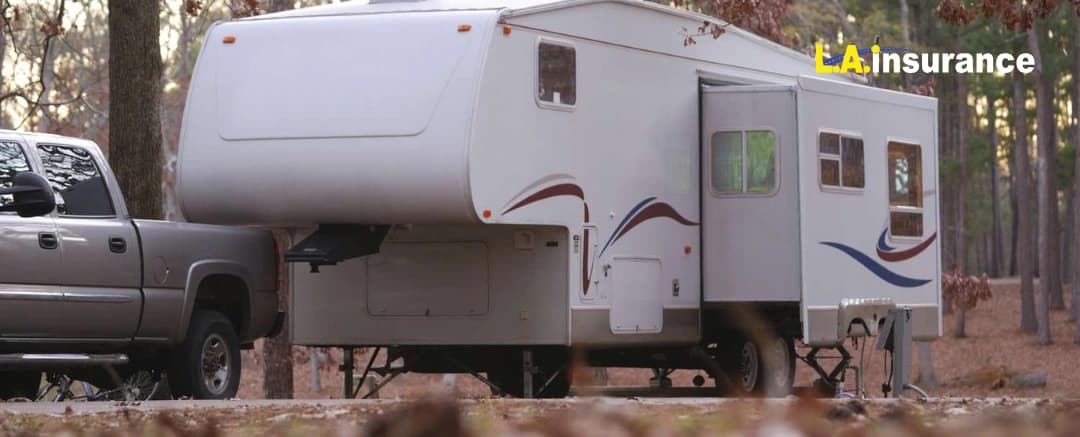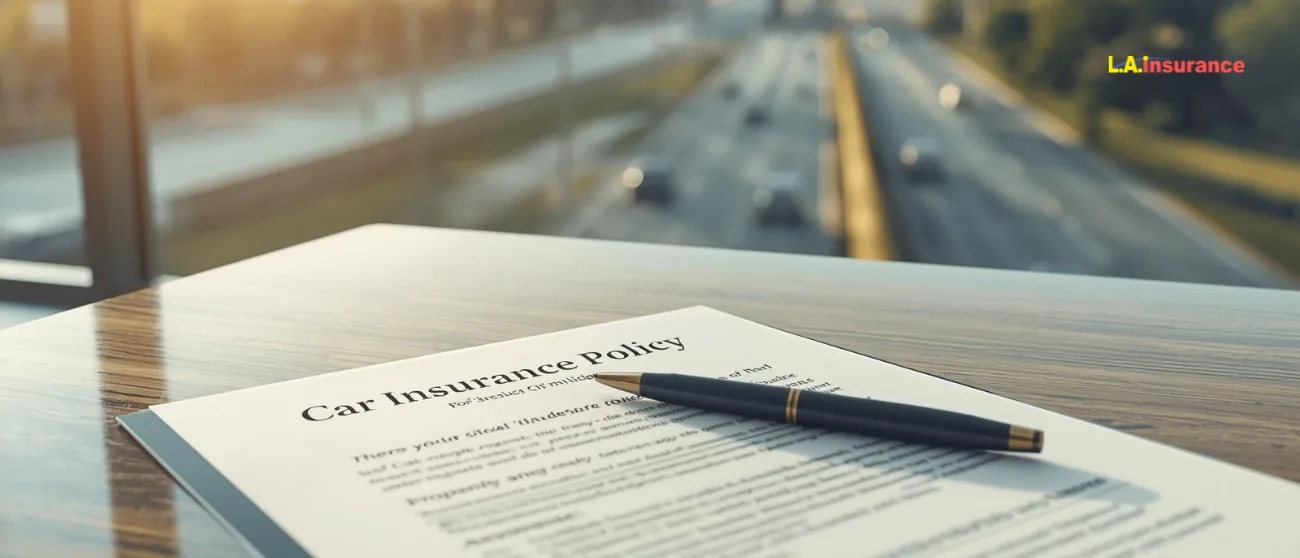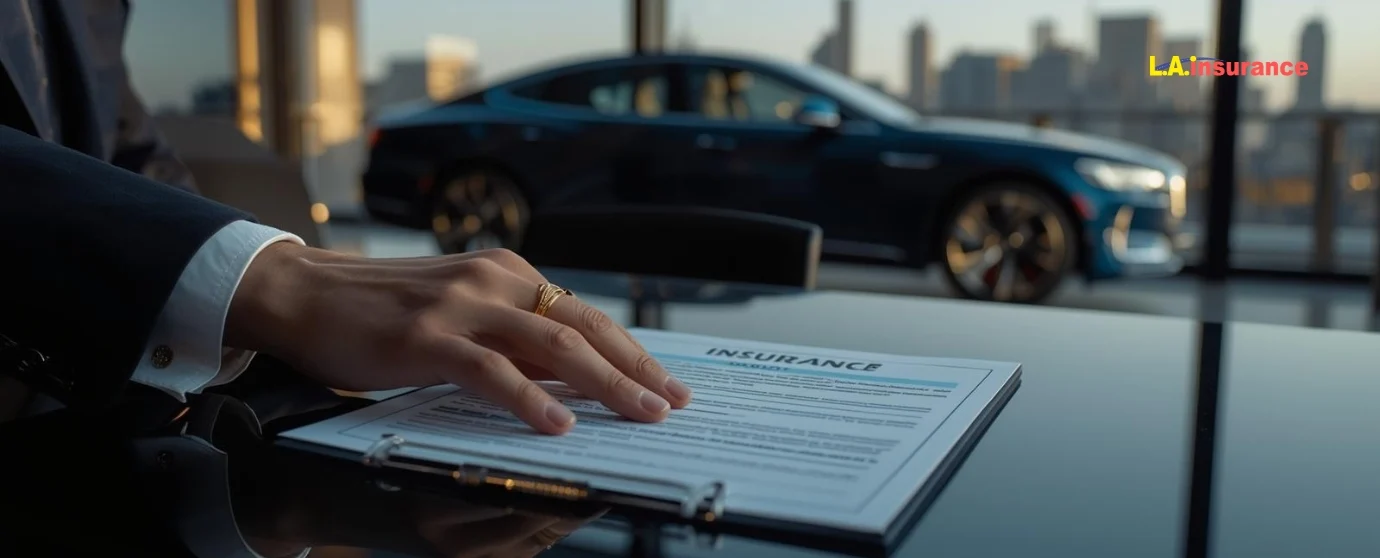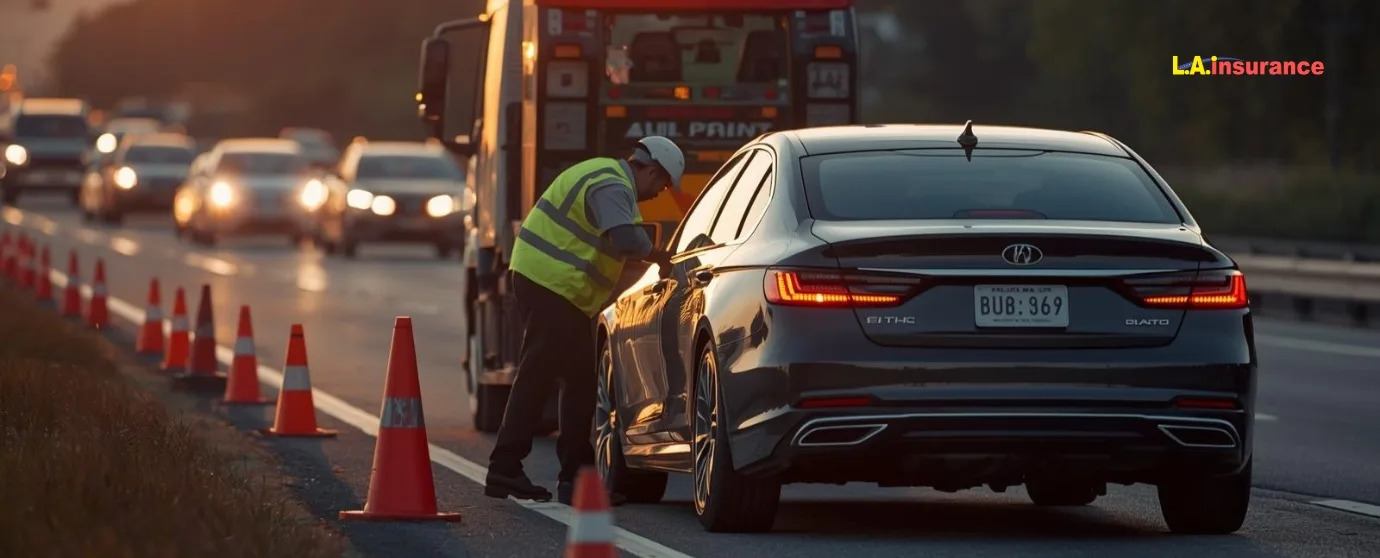
Publish Date: 09-09-2025
RV & Motorhome Insurance
Last Updated: 17-12-2025
Do You Need Insurance for RV Trailer?
Planning your next road trip with a travel trailer in tow, but unsure whether you need insurance for it? Don’t worry. Many Americans who choose recreational vehicles ask the same.
In fact, many assume their auto insurance covers RVs, including trailers, but that’s not true. You always need a separate policy for your RV, whether it’s motorized or non-motorized.
Today, we’re here to answer questions specifically about travel trailer insurance. It’s a type of non-motorized RV you tow behind a truck or SUV. It could be a fifth wheel, pop-up camper, toy hauler, or utility trailer. Many RVers use them for road trips, vacations, or even full-time living.
So, do you need insurance for an RV trailer? What are your state’s laws regarding this? What coverage options are available for trailers? How much do they cost? This article tries to answer all of those questions.
Before we start, if you're feeling a bit impatient about reading a long article, here’s the TL;DR:
- Most states don’t legally require a separate insurance policy for travel trailers. But it’s often recommended to have one.
- Michigan requires insurance for trailers with more than two wheels due to its no-fault law.
- If you financed your trailer, your lender probably requires comprehensive and collision coverage.
- Most RV insurance providers recommend comprehensive, collision, medical payment coverage, uninsured/underinsured motorist coverage, along with liability insurance.
- Tow vehicle’s liability insurance might cover basic accidents but not damage to your trailer itself.
- Coverage like roadside assistance and content protection is usually optional but highly recommended.
- The average travel trailer insurance cost ranges from $180 to $600, but could vary depending on trailer type.
Travel Trailer Insurance Requirements: Do You Need It?
Let’s clear something up first.
A travel trailer is not a motor vehicle. It doesn’t have an engine. It doesn’t move on its own. So, technically, in most states, it’s not legally required to carry an insurance policy for an RV trailer.
However, even if the state laws do not enforce insurance for travel trailers and other non-motorized RVs, you should not let your adventure companion stay uninsured.
To get affordable RV and motorhome insurance, contact L.A. Insurance today. We offer RV quotes instantly with a same-day coverage option.
There are plenty of situations where having travel trailer insurance could be useful.
Situations When Travel Insurance Is Required or Highly Recommended
Let’s break down into real-life scenarios:
1. When It’s Financed or Leased
If you didn’t pay cash for your trailer, your lender probably requires full insurance coverage. That usually means:
- Comprehensive (for theft, flood, fire, vandalism, natural disasters)
- Collision coverage (for any accident, even if it’s your fault)
A lender may require liability insurance along with two other types of coverage. When a lender invests in your RV trailer, they will provide a loan contract that protects their investment in case something goes wrong.
2. When It’s a Full-Time Residence
Do you spend more than 6 months a year in your trailer? Then it’s your permanent residence. Therefore, you should definitely carry full-timer’s RV insurance, which is more like homeowners insurance. It covers personal injury, liability, and even incidents like campsite accidents. Learn more about what full-time RV insurance is and what it covers.
3. When You’re Using It for Business
If you rent it out, haul stuff for hire, or use it as a mobile office, that’s considered commercial use of a travel trailer. And that means you’ll need commercial trailer insurance or commercial auto insurance. Please keep in mind that your personal auto insurance won’t apply in this situation. You could risk denied claims or even lawsuits.
4. When You Care About Your Stuff
Content coverage is optional, but it could be really useful, especially if you have high-value items in your trailer. We assume RVers who use their trailer for long-term residency keep a lot of valuable stuff in it, including TV, laptop, camera, camping gear, tools, fishing equipment, and even your kid's Xbox. And if any of these items get stolen, burned, or water-damaged, will your home insurance or renters insurance cover it? Probably not. And that’s why keeping personal property coverage, also known as content coverage, is really important.
5. When You Want Peace of Mind
Even if it’s not legally required, adding liability insurance or roadside assistance to your policy protects you from:
- Towing expenses
- Flat tires, brake issues, or breakdowns
- Getting sued after a freak accident
So, let’s be honest here. Trailers can be unpredictable sometimes, and so can other drivers. And to be on the safe side, it’s wiser to keep at least liability and roadside assistance.
Please note that your personal auto insurance won’t protect your recreational vehicle or trailer. So be sure to keep a separate RV or travel trailer insurance policy to protect it against the common risks.
States That Might Require Travel Trailer Insurance
When it comes to RV trailer insurance, each state has its own rule book. Although most states don’t require mandatory travel trailer insurance since it’s a non-motorized vehicle, some states may impose specific conditions.
For example, if you’re in Michigan, and if your trailer has more than two wheels, it’s considered a motor vehicle. So, yes, in this case, you need travel trailer insurance under Michigan's No-Fault Law. Without it, you can’t even register it legally.
Also, Michigan allows something called a “mini tort” claim. If your trailer is damaged, you can claim up to $3,000 from the at-fault driver.
Besides, travel trailer owners in Florida usually enjoy the benefits of an auto liability insurance policy, which extends to their trailer coverage. In this state, you’re required to carry $10,000 in liability and $10,000 in Personal Injury Protection (PIP). But Florida doesn’t have any state requirement for insuring a travel trailer as it is towed, not driven like a motorhome.
Similarly, you don’t need separate insurance for an RV trailer in California. Instead, you need liability coverage through your tow vehicle.
Other states might not require trailer insurance, but they strongly recommend it, especially if:
- Your trailer is heavy (over 2,500 lbs.)
- You cross state lines often
- You use your trailer commercially
Of note, laws can change. So, it’s always smart to check with your State DMV or a local insurance agency.
Insurance Requirements: Travel Trailer Vs. Motorhome Insurance
Travel trailers don’t have engines, so most states don’t legally require a separate insurance policy, unless it’s financed or has more than two wheels (like in Michigan). Motorhomes, on the other hand, are self-powered motor vehicles and must carry liability insurance in every state. Usage, value, and risk define coverage needs for both.
Here’s a quick comparison in terms of insurance coverage, requirements, costs, and more:
Feature | Travel Trailer | Motorhome |
Legal Insurance Req. | Usually not required as a separate policy for personal use. Liability typically extends from the towvehicle. | Always required (it's a motor vehicle and drives itself). |
Towing Vehicle Coverage | Liability usually covered by the tow vehicle's auto insurance policy. | Not applicable (self-powered). |
When Insurance is Required (Separate Policy) | Required if:- Financed: Lenders almost always require Comprehensive & Collision. Commercial Use: Specific commercial insurance is needed.- | Always required for road use (liability, and often PIP/UM). |
Types of Coverage | Liability (from towvehicle), Collision, Comprehensive, and Content Protection. | Liability, Collision, Comprehensive, Personal Injury Protection (PIP) (if in a no-fault state), Uninsured/Underinsured Motorist. |
Typical Use | Camping, hauling, occasional travel, seasonal use. | Driving and living full/part-time, extended road trips. |
Average Insurance Cost | $180–$600/year (for comprehensive/collision, if purchased separately). | $1,000–$1,500+/year (can be higher for larger, newer models). |
Special Coverages | Contents coverage, roadside assistance, vacation liability (for when parked), emergency expense, pest damage protection, roof protection. | Full-timer liability (if primary residence), roadside assistance, emergency expense, personal effects, pet injury, roof protection, total loss replacement. |
Registered as a Vehicle? | Sometimes (depends on weight and state for registration, but rarely for separate insurance unless specific state law like MI applies). | Always registered as a motor vehicle |
Do You Need Insurance for a Trailer in Michigan?
Yes, but it depends on how many wheels your trailer has.
As we've mentioned a few times earlier in this article, a trailer with more than two wheels in Michigan is required to carry liability insurance. Why is that? According to MCL Section 500.3101, a trailer with more than two wheels is legally defined as a motor vehicle under Michigan’s No-Fault Law. And as you’re aware, every motor vehicle must be insured to operate on public roads.
However, a trailer with two wheels doesn’t require insurance. Still, it’s strongly recommended to carry coverage as it could be stolen, burned, or damaged by natural hazards, even while parked. It’s also worth noting that if you’re hauling expensive gear like ATVs, boats, or motorcycles, make sure to carry separate insurance coverage for those items too.
Do You Need Insurance to Register a Travel Trailer in Michigan?
No, insurance isn’t required to register a trailer in Michigan, unless it meets the legal definition of motor vehicle (again, more than two wheels).
However, registration is still mandatory. According to the Michigan Secretary of State, all trailers, regardless of weight or use, must be registered and display a valid license plate. And if the trailer weighs 2,500 lbs. or more, it must be titled.
To register your trailer, you’ll need:
- Proof of ownership (bill of sale or title)
- Completed application
- Payment of the registration fee (based on trailer weight)
But again, insurance isn’t part of the registration process, unless the trailer qualifies as a motor vehicle.
How Much Is Travel Trailer Insurance?
As we said, travel trailer insurance isn’t required by state law. But it’s still recommended. And if you do purchase one, it may cost you around $15 to $50 per month or $180 to $600 per year. However, the actual price may depend on the type of trailer, your location, and the coverages you choose.
Average Annual Insurance Cost by Trailer Type:
- Standard travel trailer: $180-$600 per year
- Fifth wheel trailer: $300-$1,020 per year
- Teardrop camper: $144-$500 per year
- Luxury/High-end models: can exceed $1,200 per year
However, this price may vary widely based on the state or zip code you’re living in. For instance, for Michiganders, the average cost of travel trailer insurance is $431.46 per year, according to Progressive. However, this rate can increase significantly. In some areas, you might end up paying more than $700 a year for a regular RV trailer in 2025. And if it’s an RV or motorhome, the cost can range from $700 to $4,500 per year. Learn more about RV insurance costs.
Factors Affecting Travel Trailer Insurance Cost
As has been mentioned, the costs of RV trailer insurance vary for each individual. Cause several factors impact your rate, including:
- Trailer type, size, and value
- How often you use it
- Your driving record and claims history
- Insurance deductible
- Where you live (Michigan rates tend to be higher due to Michigan auto law and no-fault insurance)
- Whether it’s financed or used for full-time living
Types of Insurance Available for Travel Trailers
Travel trailer insurance can be split into two categories: basic coverage and optional add-ons. Basic coverage includes:
- Liability Insurance: Covers bodily injuries or property damage you cause with your trailer to others.
- Comprehensive Coverage: Protects against theft, fire, flood, vandalism, natural disasters (e.g., hurricane, storm, hail damage), animal collision (e.g., hitting a deer), and other unexpected incidents considered out of human control.
- Collision Coverage: Pays for trailer repairs after an accident, no matter who’s at fault.
Keep in mind that these coverages are often required by the lender if your trailer is financed.
And the optional add-ons for trailers that are worth considering:
- Content Coverage: Replaces damaged or stolen items inside your trailer (TVs, laptops, camping gear, etc.)
- Vacation Liability: Covers injuries or accidents around your trailer when parked in the campsite.
- Full-timer Coverage: Needed if your trailer is your primary residence. There’s no such coverage called “full-time coverage”. It typically includes some of the crucial basic and optional add-on protection that covers you when you need it the most.
- Roadside Assistance: For flat tires, breakdowns, and towing.
- Pest Damage, Roof Protection, and Emergency Expense: These coverages are also available through some insurers, which might be important for you depending on your situation.
What coverage you should choose for your travel trailer depends on how often you use your trailer and what it’s worth to you.
Types of Travel Trailers Covered by Insurance
No matter what you tow, there’s likely a travel trailer insurance policy for it.
Here are the most common types:
- Conventional Travel Trailers: Standard tow-behinds with living space.
- Fifth Wheels: Larger, luxury-style trailers that hitch into a truck bed.
- Teardrop Campers: Small, lightweight trailers perfect for short trips.
- Pop-up Campers: Collapsible units are great for casual camping.
- Toy Haulers: Travel trailers with built-in garages for ATVs, bikes, or gear.
- Truck Campers: Slide into the bed of a pickup; may be insured differently.
- Utility & Cargo Trailers: Used for storage, hauling tools, or personal items.
According to Consumer Affairs, over 11.2 million households in the U.S. own some form of recreational vehicle. And nearly all types are eligible for coverage if you choose the right policy.
Get Travel Trailer Insurance Quote Today from L.A. Insurance
If you need to insure your RV trailer with reliable and affordable coverage, L.A. Insurance is your most trusted choice. We’re a Michigan-based independent insurance agency offering affordable coverage for travel trailers and motorhomes across multiple states, including Texas, Colorado, Florida, Arizona, Georgia, Nevada, and more. Whether you own a travel trailer, fifth wheel, pop-up camper, teardrop trailer, utility trailer, or truck camper, we’ll make sure you get the protection you need. Get your free RV and motorhome insurance quote online today or find an insurance agent near you.
Here's what you need to get a travel trailer insurance quote:
- Trailer make, model, and year
- Current value or purchase price
- Where it’s stored or parked
- How often you use it (weekends or full-time)
- Your driver’s license and basic contact info
To learn more about travel trailer insurance, talk to an agent, or get a quote, please call us at (800) 893-9393.
How to Get Cheaper Travel Trailer Insurance Quote
Travel trailer insurance doesn’t cost a fortune. Paying a very small amount every month could save you from a sudden, substantial expense. Here are a few effective ways to get an affordable insurance quote for your RV trailer:
- Compare quotes. Get at least 3 trailer insurance quotes from different providers before you make a decision.
- If you have savings for an emergency, increase your deductible. This can lower your premium.
- Make sure to bundle it with auto policy. If it’s combined with home insurance, auto insurance, or renters insurance, you could save around 25%.
- Limit coverage during off-season. If you’re not using it in winter, drop liability and other coverage and keep only comprehensive coverage to stay protected from theft, fire, and vandalism.
- Install anti-theft devices. Adding a GPS tracker or alarm may earn you a safety discount.
- Drive safely and keep a clean record. Fewer claims mean lower risks and better rates.
- Ask for discounts if you’re an original owner, have been claim-free for a year, or are paying annually.
Insurance Requirements for RV Trailer: The Bottom Line
So the final statement about whether you need RV trailer insurance or not is yes. You do need travel trailer insurance, even though it’s generally not required by state law. It not only provides smart protection for your trailer but also meets the requirements of your lender if it’s financed. In some states, like Michigan, if your RV trailer has more than two wheels, it’s considered a motor vehicle, which means you’re legally obligated to carry minimum liability insurance and personal injury protection (PIP). Even when it’s not required, coverage for accidents, theft, and liability can save you thousands.
FAQs About Do you need RV trailer insurance
Do RVs need insurance?
Yes, if your RV is a motorized vehicle and can be driven, then you at least need to maintain state-mandated minimum liability insurance for it. However, for non-motorized RVs like travel trailers, you’re not usually legally required to carry insurance.
What does travel trailer insurance cover?
It covers many risks, including bodily injuries or property damage you cause to others using your trailer, fire, theft, natural disasters, accidents, roadside assistance (towing, flat tire), and personal belongings coverage (valuable items inside your trailer).
What does RV trailer insurance not cover?
It usually doesn’t cover wear and tear, mechanical breakdowns, intentional damage, or racing-related incidents.
Do pull behind campers need insurance?
Not always legally, but if financed, yes. And insurance is recommended to protect from damage and liability.
What insurance do I need for my trailer?
At minimum: liability. For full protection, you should also add comprehensive, collision, and contents coverage based on trailer use
Editorial Disclaimer
The information provided on this blog is for general informational purposes only and does not constitute professional insurance, legal, or financial advice. Coverage and rates are subject to individual eligibility, underwriting guidelines, and state availability. For specific questions regarding your policy or to get an accurate quote, please contact a licensed L.A. Insurance agent directly. We're an independent agency and not a direct insurance carrier. For more information on how we operate and handle your data, please see our Terms and Conditions and Privacy Policy.
Tag :
RV & Motorhome Insurance








